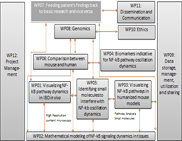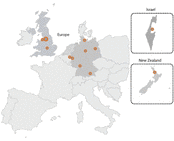WP07 - Feeding patients findings back to basic research and vice versa
Objectives
The objective of WP07 is to link the basic research, mathematical modelling and discovery of small molecules back to the clinical situation of patients with inflammatory bowel disease (IBD). To this end, we will define NF-kappa-B dynamics in peripheral blood-derived CD14+ monocytes and CD4+ T cells from IBD patients and controls. Furthermore, we will quantify multiple NF-kappa-B pathway components and downstream targets in static measurements of blood cells and intestinal biopsies as reporters of NF-kappa-B dynamics and IBD status (biomarkers) and correlate these measurements with NF-kappa-B dynamics in peripheral blood cells.
The predicted outcome of this work package is to gain more detailed understanding of the pathophysiology of IBD and to define biomarkers for early patient stratification and prediction of treatment outcome for personalized medicine.
Workpackage Description
In this WP we aim to identify changes of NF-kappa-B dynamics in different groups of IBD patients and controls. We will develop methods for studying NF-kappa-B oscillation by time-lapse microscopy in monocytes and T cells from peripheral blood cells. Furthermore, we will quantify components of the NF-kappa-B pathway and downstream targets in fixed samples, such as blood cells and intestinal biopsies, in order to predict NF-kappa-B dynamics through mathematical modelling and to identify possible biomarkers.
For the dynamic measurements, we will express fluorescence-labelled components of the NF-kappa-B reporters by retroviral transfection in primary blood derived monocytes and lymphocytes from IBD patients and controls. NF-kappa-B dynamics upon in vitro stimulation of the cells will be analysed by confocal time lapse microscopy.
For the static measurements we will establish high-through put methods based on flow cytometry, magnetic bead technology, and microchip assays to obtain quantitative measurements of NF-kappa-B pathway components and downstream targets. Through mathematical modelling, we aim to predict NF-kappa-B dynamics by the quantitative measurement of the absolute and relative expression of selected activating and inhibiting factors of the NF-kappa-B pathway.
We will perform a cross-sectional study with a large patient cohort from the three clinical centers in Liverpool, Maastricht and Aachen. Patients will be stratified by established disease activity and endoscopic scores and by the presence of complications and extraintestinal manifestations. Furthermore, we will follow-up specific patients groups such as newly diagnosed patients and patients starting with an anti-TNF treatment.
If we identify specific changes of NF-kappa-B activity and dynamics that are unrelated to the actual inflammatory status, but are related to the presence of IBD, these patients will be further explored by exome-sequencing/ (epi)genotyping (WP08), in order to characterise genetic variability behind the observed dynamics of NF-kappa-B activation.




